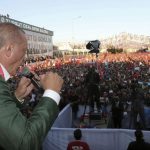It’s fair to say Turkey’s ruling party has a knack for discovering enemies in unexpected places, and government friendly media channels on Monday added a new one to the seemingly endless list that would grow even further by the week’s end.
As usual, headlines reported statements by President Recep Tayyip Erdoğan, who took a break from calling his opponents terrorists over the weekend to instead get a little abstract, vowing to put an end to the opposition’s “masquerade ball”.
This was another implication by Erdoğan that opposition parties are conspiring in sneaky, sinister and underhand business ahead of the March 31 local elections, though by alluding that they were doing so while decked out frivolously in carnival costumes and Venetian masks, the president’s intent may have backfired.
Equally so of Akşam’s headline, which bestowed the opposition with a rather dashing nickname: “the Masked Alliance.” A welcome change for Turks tiring of variations of the generic “terrorist”, though it lacks the visceral punch of last year’s assigned enemies, the “Meat Barons” or the vague-to-the-point-of-surreal “Crisis Lobby”.
The next day the same newspapers ripped the masks off yet another enemy of Turkey’s: the “crusader threat” posed by the people of Australia and New Zealand, who Erdoğan and his loyal band of journalists will have you know are clamouring to launch a new invasion.
This was the beginning of a dizzying ride through history, starting in 1915 and Gallipoli, the battleground of a disastrous allied campaign against the crumbling Ottoman Empire that left thousands of conscripts from Australia and New Zealand, and many Turks, butchered like lambs to the slaughter .
Gallipoli may have become an emotional bond linking Turks to their antipodean cousins for a century, but that didn’t stop Erdoğan from likening the killer of 50 worshippers in two New Zealand mosques to the Anzac conscripts who died there.
“We buried your grandfathers, and we’ll bury you too,” was the message from Erdoğan, delivered on fundamentalist rag Yeni Akit’s Tuesday front page. In that light, the headline on various other pro-government rags on the same day – “We’re waiting for you in Çanakkale” could be the tagline that sinks a thousand local tourism companies.
By the end of the week Erdoğan had travelled even further back in time to the gates of Vienna, where the Ottoman army’s sieges were repelled in the 16th and 17th centuries. The Christchurch killer had etched “Vienna 1683”, the date of the second siege on the weapon he used to massacre worshippers at the mosques, and like the Australian white supremacist, Erdoğan implored his audience not to forget the siege – “the foreign man doesn’t!”
Why the Turkish president would be so eager to recall a defeat that was arguably the starting point for centuries of Ottoman decline is anyone’s guess, though judging by his descent into the history books ahead of the March 31 local elections, there’s not too much present glory to harp on.
That was very much the feeling on Friday despite the best efforts of his son-in-law and finance minister Berat Albayrak, whose mastery of optics saw him sweating bucketsthrough an all-important presentation to investors as the lira plummeted last year and routinely has him struggling to contain a smirk while discussing the grave matter of Turkey’s ailing economy.
That morning there had been signs the lira could be on its way to a repeat of last year’s crisis. The currency went on to fall over 4 percent against the dollar by Friday evening. It seemed the markets had reacted strongly to dual causes for concern: the first being the central bank’s announcement of a sudden $6.3 billion drop in foreign currency reserves, the second the prospect of yet another spat with the United States after Erdoğan reacted strongly to a tweet by the U.S. president.
Or had they? Not according to Albayrak, who during an interview with three fawning journalists on A Haber explained the real culprits behind the lira’s fall: speculative social media manipulators and the people who protested against the demolition of a central Istanbul park in 2013.
Albayrak came armed with little a cardboard cut-out showing Turkey’s GDP decline since the protests took place, appealing to Turks’ memories of a sunnier period in recent history.
Yet if Albayrak, like his father-in-law, had to delve into the past to find excuses for a less-than-rosy present, he still spared a word or two for the future, for which the young finance minister holds an almost endearingly naïve optimism.
“We’ll announce our roadmap in April. We have taken steps in the last few months that would have taken eight or nine months. The outlook after the elections is extremely positive,” he said, as his three interviewers nodded and smiled.
None mentioned that the mythical “plans to be revealed in the near future” have become a calling card of Albayrak’s amid the series of economic hits the country has taken since he was appointed last June, nor that, despite the minister’s promises of a strong economic performance, single-digit inflation and so on just around the corner, the economy is showing no signs of dragging itself out of recession as foreign investors prepare to jump ship.
Pro-government newspapers’ silence on all of this on Saturday morning was deafening: not a single front page touched on the lira slide of the previous day.
There are signs, though, that the attempts to mask actual news with talk of crusaders, manipulators and foreign enemies are at best showing diminishing returns: the circulation of once-mighty newspapers has slowed to a trickle under pro-government ownership, and people are turning increasingly to alternative news sources.
Forget the siege of Vienna, Gallipoli, masquerade balls and 12th Century holy wars. Whether that will translate to significant opposition victories on March 31 – recent polls have shown there’s a chance – is the really crucial question for Turks here and now, in 2019.
Source: Ahval News



